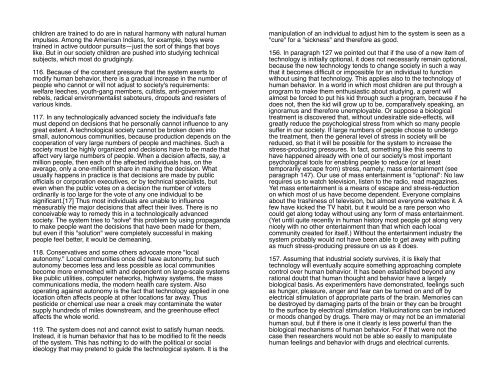Unabomber Manifesto - ouroboros ponderosa
Unabomber Manifesto - ouroboros ponderosa
Unabomber Manifesto - ouroboros ponderosa
Create successful ePaper yourself
Turn your PDF publications into a flip-book with our unique Google optimized e-Paper software.
children are trained to do are in natural harmony with natural humanimpulses. Among the American Indians, for example, boys weretrained in active outdoor pursuits—just the sort of things that boyslike. But in our society children are pushed into studying technicalsubjects, which most do grudgingly.116. Because of the constant pressure that the system exerts tomodify human behavior, there is a gradual increase in the number ofpeople who cannot or will not adjust to society's requirements:welfare leeches, youth-gang members, cultists, anti-governmentrebels, radical environmentalist saboteurs, dropouts and resisters ofvarious kinds.117. In any technologically advanced society the individual's fatemust depend on decisions that he personally cannot influence to anygreat extent. A technological society cannot be broken down intosmall, autonomous communities, because production depends on thecooperation of very large numbers of people and machines. Such asociety must be highly organized and decisions have to be made thataffect very large numbers of people. When a decision affects, say, amillion people, then each of the affected individuals has, on theaverage, only a one-millionth share in making the decision. Whatusually happens in practice is that decisions are made by publicofficials or corporation executives, or by technical specialists, buteven when the public votes on a decision the number of votersordinarily is too large for the vote of any one individual to besignificant.[17] Thus most individuals are unable to influencemeasurably the major decisions that affect their lives. There is noconceivable way to remedy this in a technologically advancedsociety. The system tries to "solve" this problem by using propagandato make people want the decisions that have been made for them,but even if this "solution" were completely successful in makingpeople feel better, it would be demeaning.118. Conservatives and some others advocate more "localautonomy." Local communities once did have autonomy, but suchautonomy becomes less and less possible as local communitiesbecome more enmeshed with and dependent on large-scale systemslike public utilities, computer networks, highway systems, the masscommunications media, the modern health care system. Alsooperating against autonomy is the fact that technology applied in onelocation often affects people at other locations far away. Thuspesticide or chemical use near a creek may contaminate the watersupply hundreds of miles downstream, and the greenhouse effectaffects the whole world.119. The system does not and cannot exist to satisfy human needs.Instead, it is human behavior that has to be modified to fit the needsof the system. This has nothing to do with the political or socialideology that may pretend to guide the technological system. It is themanipulation of an individual to adjust him to the system is seen as a"cure" for a "sickness" and therefore as good.156. In paragraph 127 we pointed out that if the use of a new item oftechnology is initially optional, it does not necessarily remain optional,because the new technology tends to change society in such a waythat it becomes difficult or impossible for an individual to functionwithout using that technology. This applies also to the technology ofhuman behavior. In a world in which most children are put through aprogram to make them enthusiastic about studying, a parent willalmost be forced to put his kid through such a program, because if hedoes not, then the kid will grow up to be, comparatively speaking, anignoramus and therefore unemployable. Or suppose a biologicaltreatment is discovered that, without undesirable side-effects, willgreatly reduce the psychological stress from which so many peoplesuffer in our society. If large numbers of people choose to undergothe treatment, then the general level of stress in society will bereduced, so that it will be possible for the system to increase thestress-producing pressures. In fact, something like this seems tohave happened already with one of our society's most importantpsychological tools for enabling people to reduce (or at leasttemporarily escape from) stress, namely, mass entertainment (seeparagraph 147). Our use of mass entertainment is "optional": No lawrequires us to watch television, listen to the radio, read magazines.Yet mass entertainment is a means of escape and stress-reductionon which most of us have become dependent. Everyone complainsabout the trashiness of television, but almost everyone watches it. Afew have kicked the TV habit, but it would be a rare person whocould get along today without using any form of mass entertainment.(Yet until quite recently in human history most people got along verynicely with no other entertainment than that which each localcommunity created for itself.) Without the entertainment industry thesystem probably would not have been able to get away with puttingas much stress-producing pressure on us as it does.157. Assuming that industrial society survives, it is likely thattechnology will eventually acquire something approaching completecontrol over human behavior. It has been established beyond anyrational doubt that human thought and behavior have a largelybiological basis. As experimenters have demonstrated, feelings suchas hunger, pleasure, anger and fear can be turned on and off byelectrical stimulation of appropriate parts of the brain. Memories canbe destroyed by damaging parts of the brain or they can be broughtto the surface by electrical stimulation. Hallucinations can be inducedor moods changed by drugs. There may or may not be an immaterialhuman soul, but if there is one it clearly is less powerful than thebiological mechanisms of human behavior. For if that were not thecase then researchers would not be able so easily to manipulatehuman feelings and behavior with drugs and electrical currents.






